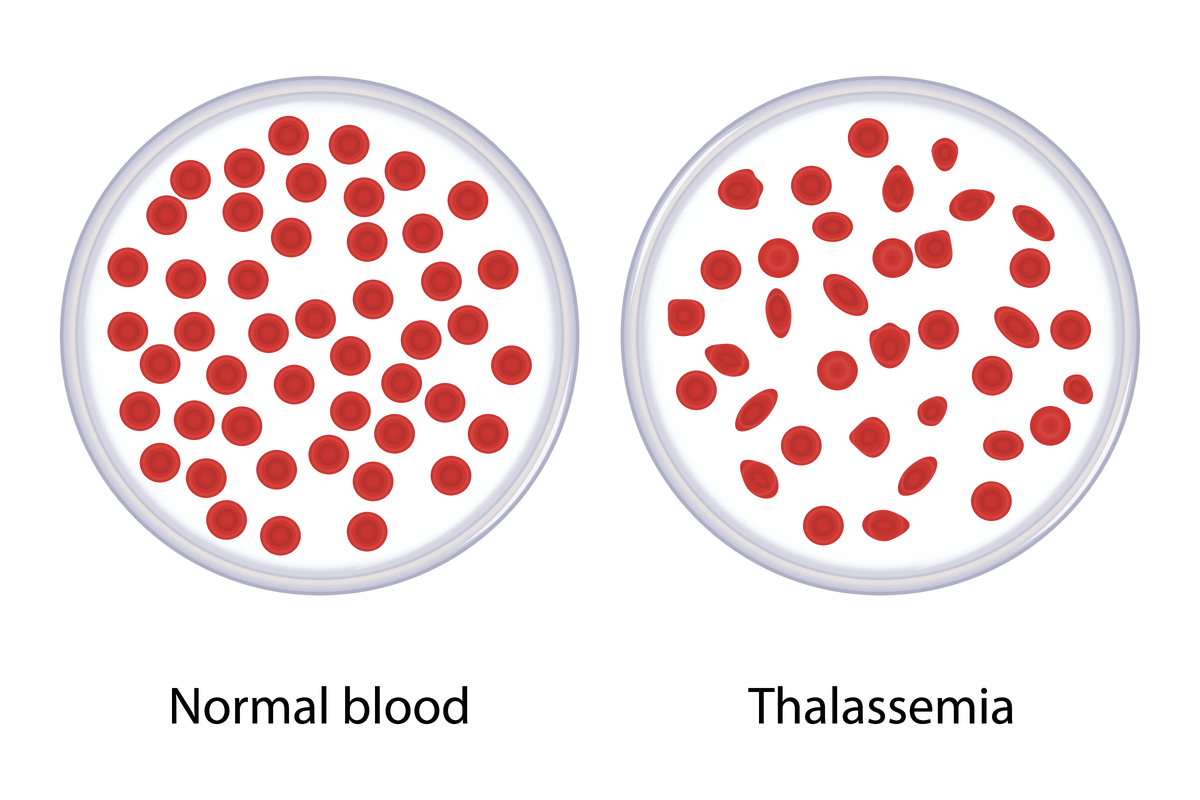- Phone: +91-9818265787
- +91-8860760993
- Mon-Sat : 09:00 AM – 05:00 PM
- [email protected]

Red blood cells provide oxygen to all of the body’s cells. Oxygen is a type of nourishment that cells consume in order to operate properly. When there aren’t enough healthy red blood cells, oxygen isn’t supplied to the rest of the body’s cells, which can make a person feel lethargic, weak, or short of breath. In persons with thalassemia, Anemia can vary from mild to severe. Severe Anemia can cause organ damage and even death.
What are some of the signs and symptoms of thalassemia?
Thalassemia symptoms can vary depending on the clinical severity of the disease and the treatments used to treat it. Symptoms may differ from child to child. Patients with the thalassemia trait don’t usually have any symptoms.
How is thalassemia diagnosed? How can you know if you have thalassemia?
After testing to determine the kind of thalassemia a kid has, a diagnosis of thalassemia is established.
Doctors will be able to detail the best therapy alternatives after those tests are completed.
What is the treatment for thalassemia?
Children with thalassemia require a multidisciplinary approach that includes hematologists and transfusion medicine specialists, as well as cardiologists, endocrinologists, gastroenterologists, audiologists, ophthalmologists, infectious disease specialists, geneticists, and genetic counselors as needed.
The severity of thalassemia determines how it is treated. If your kid has transfusion-dependent thalassemia, she will need lifelong medical treatment, which may include:
Dr. Vikas Dua is the best Doctor For Thalassemia In India and one of a kind. He treats special cases of thalassemia in children. Dr. Vikas is an exceptional hematologist who has profound expertise in handling delicate babies. This compassionate side of our blood experts comes to the forefront during blood transfusions which is the standard treatment protocol for patients with thalassemia major. With a vision of Anemia free and thalassemia-free India, he provides the best Thalassemia Treatment. Contact Dr. Vikas Dua, one of the best Thalassemia Treatment Doctors in Gurgaon today to make your appointment.
Immunodeficiency disorders
Immunodeficiency disorders are immune system failures that cause infections to develop and reoccur more frequently, to be more severe, and to stay longer than they should. Immunodeficiency disorders are most commonly caused by the use of a medicine or a long-term serious disease (such as cancer), although they can also be hereditary. People with autoimmune disorders or cancer are more likely to have numerous, uncommon, or extremely severe or persistent infections.
In fact, immunodeficiency commonly affects numerous components, with severe combined immunodeficiency (which is primary) and acquired immune deficiency syndrome (which is secondary).
1. Primary immunodeficiency
From childhood onwards, the number of uncommon disorders has an increased vulnerability to infections. Congenital immunodeficiency is another name for primary immunodeficiency. Many of these disorders are autosomal recessive or X-linked in nature. There are around 95 known primary immunodeficiency disorders, which are classified based on which portion of the immune system is affected, such as lymphocytes or granulocytes.
Primary immunodeficiencies are treated with antibody infusions, long-term antibiotics, and (in certain circumstances) stem cell transplantation, depending on the severity of the abnormality. X-Linked Agammaglobulinemic and Common Variable Immune Deficiency are two disorders that have features of absent and/or compromised antibody functions.
2. Secondary immunodeficiencies
Secondary immunodeficiencies, sometimes called acquired immunodeficiencies, can be caused by a variety of immunosuppressive causes, such as starvation, aging, or certain medicines (e.g., chemotherapy, disease-modifying antirheumatic drugs, immunosuppressive drugs after organ transplants, glucocorticoids). Immunosuppression refers to both the positive and negative impacts of reducing immune systems with drugs, whereas immunodeficiency only refers to the negative effect of increased infection risk.
Immunosuppression is caused by a variety of diseases, either directly or indirectly. Many kinds of cancer, especially those of the bone marrow and blood cells (leukemia, lymphoma, multiple myeloma), as well as many chronic infections, fall under this category. Immune deficiency can be caused by a variety of hormonal and metabolic conditions, such as anemia, hypothyroidism, and hyperglycemia.
Treatment for thalassemia usually involves a bone marrow transplant, so the prices can be high, but India can be a more affordable option. Currently, thalassemia treatment is quite expensive in western countries. Compared to other treatments, the cost of Thalassemia Treatment in India costs around USD 25000. In addition to costs, the traveler’s country of origin, the number of days they will be in India for thalassemia treatment, and the number of travelers will influence the cost. The country offers quality and affordable bone marrow transplants to adult and pediatric patients from around the world.
Dr. Vikas Dua is one of the best haemato oncologists in India known for his excellent work in stem cell transplantation, which is highly successful. He serves patients from around the world. As the best Thalassemia Doctor in India, he is able to deliver excellent results for anyone who travels to India for bone marrow transplant treatment.